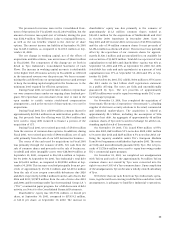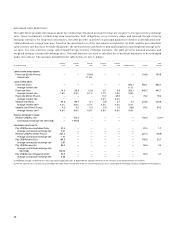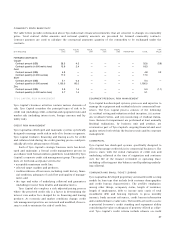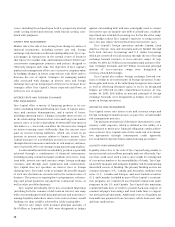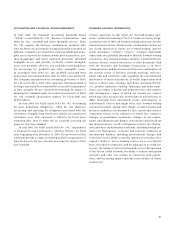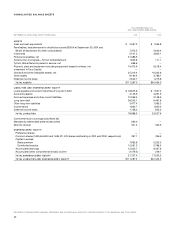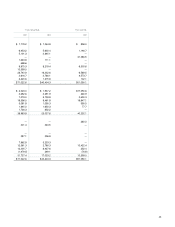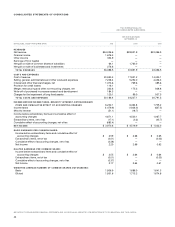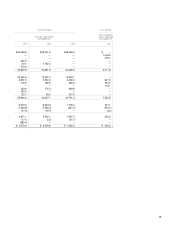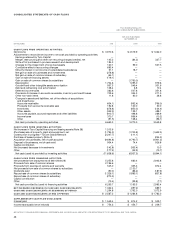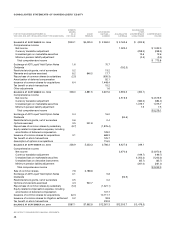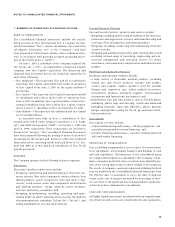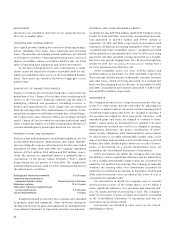ADT 2001 Annual Report Download - page 43
Download and view the complete annual report
Please find page 43 of the 2001 ADT annual report below. You can navigate through the pages in the report by either clicking on the pages listed below, or by using the keyword search tool below to find specific information within the annual report.
41
ACCOUNTING AND TECHNICAL PRONOUNCEMENTS
In June 2001, the Financial Accounting Standards Board
(“FASB”) issued SFAS No. 141, “Business Combinations,” and
SFAS No. 142, “Goodwill and Other Intangible Assets.” SFAS
No. 141 requires all business combinations initiated after
June 30, 2001 to be accounted for using the purchase method. In
addition, companies are required to review goodwill and intan-
gible assets reported in connection with prior acquisitions, pos-
sibly disaggregate and report separately previously identified
intangible assets and possibly reclassify certain intangible
assets into goodwill. SFAS No. 142 establishes new guidelines
for accounting for goodwill and other intangible assets.
In accordance with SFAS No. 142, goodwill associated with
acquisitions consummated after June 30, 2001 is not amortized.
The Company implemented the remaining provisions of SFAS
No. 142 on October 1, 2001. Since adoption, existing goodwill is
no longer amortized but instead will be assessed for impairment
at least annually. We are currently determining the impact of
adopting this standard under the transition provisions of SFAS
No. 142. Goodwill amortization expense for Fiscal 2001 was
$597.2 million.
In June 2001, the FASB issued SFAS No. 143, “Accounting
for Asset Retirement Obligations.” SFAS No. 143, addresses
accounting and reporting for obligations associated with the
retirement of tangible long-lived assets and the associated asset
retirement costs. This statement is effective for fiscal years
beginning after June 15, 2002. We are currently assessing the
impact of this new standard.
In July 2001, the FASB issued SFAS No. 144, “Impairment
or Disposal of Long-Lived Assets,” which is effective for fiscal
years beginning after December 15, 2001. The provisions of this
statement provide a single accounting model for impairment of
long-lived assets. We are currently assessing the impact of this
new standard.
FORWARD-LOOKING INFORMATION
Certain statements in this report are “forward-looking state-
ments” within the meaning of the U.S. Private Securities Litiga-
tion Reform Act of 1995. All forward-looking statements involve
risks and uncertainties. All statements contained herein that are
not clearly historical in nature are forward-looking, and the
words “anticipate,” “believe,” “expect,” “estimate” and similar
expressions are generally intended to identify forward-looking
statements. Any forward-looking statement contained herein,
in press releases, written statements or other documents filed
with the Securities and Exchange Commission, or in Tyco’s
communications and discussions with investors and analysts in
the normal course of business through meetings, webcasts,
phone calls and conference calls, regarding the consummation
and benefits of future acquisitions, as well as expectations with
respect to future sales, earnings, cash flows, operating efficien-
cies, product expansion, backlog, financings and share repur-
chases, are subject to known and unknown risks, uncertainties
and contingencies, many of which are beyond our control,
which may cause actual results, performance or achievements to
differ materially from anticipated results, performances or
achievements. Factors that might affect such forward-looking
statements include, among other things, overall economic and
business conditions; the demand for Tyco’s goods and services;
competitive factors in the industries in which Tyco competes;
changes in government regulations; changes in tax require-
ments (including tax rate changes, new tax laws and revised tax
law interpretations); results of litigation; interest rate fluctua-
tions and other capital market conditions, including foreign cur-
rency rate fluctuations; economic and political conditions in
international markets, including governmental changes and
restrictions on the ability to transfer capital across borders; Tyco
Capital’s ability to access funding sources on a cost-effective
basis, its credit loss experience and the adequacy of its credit loss
reserve; the timing of construction and the successful operation
of the TyCom Global Network; the ability to achieve anticipated
synergies and other cost savings in connection with acquisi-
tions; and the timing, impact and other uncertainties of future
acquisitions.




